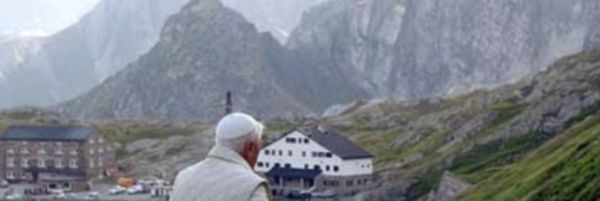Dear Brothers and Sisters,
This evening, in stillness and moved in heart, we have journeyed in prayer along the Way of the Cross. We have gone up Calvary with Jesus and we have meditated on his suffering, rediscovering how deep his love was and is for us. But let us not limit ourselves to a compassion dictated be weak sentiment; rather, we wish to participate in the sufferings of Jesus, we wish to accompany our Master, to share his Passion in our lives, in the life of the Church, for the life of the world, since we know that it is precisely in the Lord’s Cross, in love without limits, that he gives everything of himself, is the source of grace, of liberation, of peace, of salvation.
The texts, the meditations and the prayers of the Way of the Cross have helped us to consider the mystery of the Passion in order to appreciate the great lesson of love which God gave on the Cross, that there might be born in us a renewed desire to change our hearts, living each day that love which is the only force able to change the world.
This evening we have gazed upon Jesus and his countenance marked by pain, derided, outraged and disfigured by the sin of humanity; tomorrow night we will look upon the same countenance full of joy, radiant and luminous. From the moment Jesus goes into the tomb, the tomb and death are no longer a place without hope where history stops in the most complete failure, where man touches the extreme limit of his powerlessness. Good Friday is the greatest day of hope, come to fruition upon the Cross, as Jesus dies, as he draws his last breath, crying out with a loud voice, “Father, into your hands I commend my spirit” (Lk 23:46). Entrusting his “given” existence into the Father’s hands, he knows that his death is becoming the source of life, just as the seed in the earth must be destroyed that a new plant may be born: “If a grain of wheat falls into the earth and dies, it remains alone; but if it dies, it bears much fruit” (Jn 12:24). Jesus is the grain of wheat that falls to the earth, is split open, is destroyed and dies, and for this very reason is able to bear fruit. From the day on which Christ was raised upon it, the Cross, which had seemed to be a sign of desolation, of abandonment, and of failure, has become a new beginning: from the profundity of death is raised the promise of eternal life. The victorious splendour of the dawning day of Easter already shines upon the Cross.
In the silence of this night, in the silence which envelopes Holy Saturday, touched by the limitless love of God, we live in the hope of the dawn of the third day, the dawn of the victory of God’s love, the luminous daybreak which allows the eyes of our heart to see afresh our life, its difficulties, its suffering. Our failures, our disappointments, our bitterness, which seem to signal that all is lost, are instead illumined by hope. The act of love upon the Cross is confirmed by the Father and the dazzling light of the resurrection enfolds and transforms everything: friendship can be born from betrayal, pardon from denial, love from hate.
Grant us, Lord, to carry our cross with love, and to carry our daily crosses in the certainty that they have been enlightened by the dazzling light of Easter. Amen.
[Pope Benedict, Way of the Cross at the Colosseum 2 April 2010]












